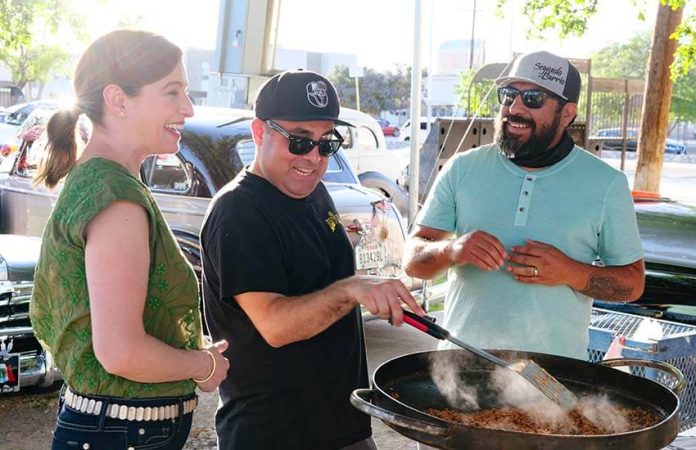Acclaimed chef Pati Jinich remembers the distinctive menudo she tried on both sides of the Mexico-United States border, in Ciudad Juárez, Chihuahua, and El Paso, Texas. In both cities, it is eaten with hominy and served with bread — not with corn tortillas, as is the case elsewhere in Mexico.
“Mexican cuisine continues to evolve and thrive north of the border,” Jinich noted. And, she said, “there are nuances you find in the foods on one side and the other.”
That’s true of life along the border in general, Jinich has found, in contrast to the narrative of a region dominated by immigration and crime. She explores these complexities in a new two-part TV series, La Frontera with Pati Jinich, which debuts on PBS on October 15.
“I am so excited about the premiere of episode one,” she said. “It’s really been a long time in the making. I loved every person we met, every story they were helping to share. I can’t wait for people to see it.”
It’s the first-ever PBS special for Jinich, who is also the host of the network’s long-running, award-winning program, Pati’s Mexican Table, which explores her homeland through food. The show is on PBS in the United States and is streamed worldwide on Amazon Prime.
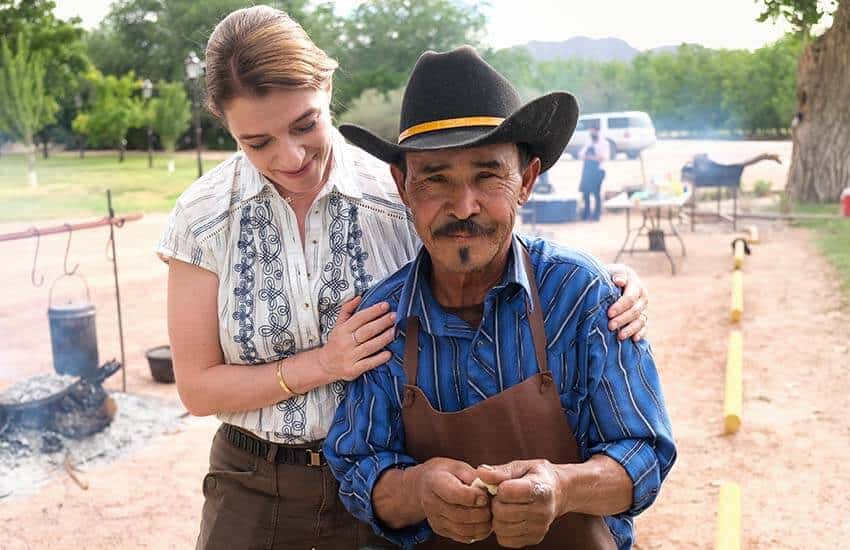
Jinich was born and raised in Mexico City. Currently based in Washington, D.C., with her family, she said that as she explored more of Mexico through her current show, she got the idea for a special about the border.
“I became very, very attracted to the border, that world of two countries, two countries I love,” she said. “I did so much research. Finally, I was able to go to the border.”
There were challenges during filming due to the COVID-19 pandemic, which closed many points of entry. In general, she said, migration between Mexico and the United States is “always complicated and evolving.”
The series addresses many other topics as it journeys eastward along the Rio Grande.
“I hope people realize the border is much more than a fence,” Jinich said. “Through the region, between the U.S. and Mexico, it changes at every kilometer. In Marfa [in Texas], there is a thriving culture and art scene … At the end of Brownsville, they have SpaceX, where Elon Musk is trying to launch humans to Mars. There are so many more things happening at the border than people know or read about.”
Episode two will include a visit to Laredo, Texas, and Nuevo Laredo, Tamaulipas, with a stop at the main truck port along the entire border and a look at the Tecos — a minor-league baseball team that is the only binational baseball squad in existence, according to the show.
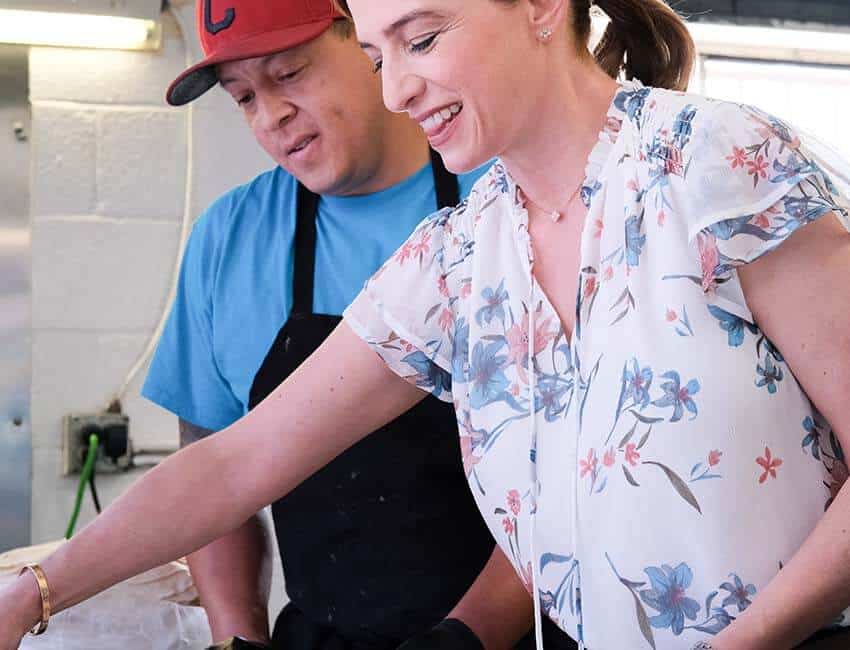
“The landscape changes incredibly as you move from El Paso to Laredo. Big Bend [National Park] has such a natural beauty,” Jinich said. “You don’t think about the stunning nature until you get to Laredo and Nuevo Laredo.”
She also mentioned the Rio Grande Valley as well as the eastward points of Brownsville, Texas; Matamoros, Tamaulipas; and McAllen, Texas. And, she said, “You have a jungle, the Sabal palm tree sanctuary.”
“People don’t know about these places at the border where they’re trying to protect natural resources, animals that are kind of unique, plants that are extraordinary,” she said. “All these affect the border today.”
In addition to getting ready for the new special, hosting her current program and being the resident chef at the Mexican Cultural Institute in Washington, D.C., Jinich is preparing for the launch of her third cookbook, Treasures of the Mexican Table, in November.
The book goes beyond well-known Mexican foods like carnitas and birria to explore 150 recipes that Jinich describes as classics of her country that Americans may not be familiar with.
“They are delicious and accessible, ready to enter readers’ kitchens and homes,” she said.
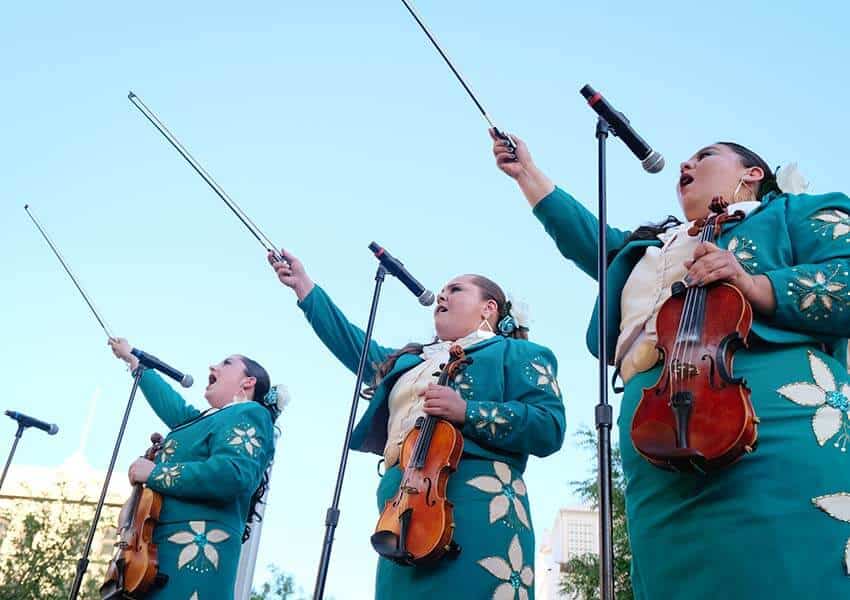
Accessibility was also something Jinich noticed while traveling along the border for La Frontera. “People at the border are incredibly accessible,” she said, adding that they are also “resilient.”
“They can navigate two countries, two cultures, two languages in an environment that is not one country but two at the same time. They are never given any credit.”
In episode one, Jinich’s interviewees include Oscar Herrera, who runs restaurants on both sides of the border; journalist Alfredo Corchado, whose regular beat includes crime and drug cartels but who also has a love of food steeped in his family narrative; and the Mariachi Femenil Flores Mexicanas, an all-female mariachi band.
“You find at the border a place where traditions are held onto so tightly,” Jinich said. “At the same time, it’s a place of opportunity where new things can happen. I don’t think you would ever find a female mariachi band at the heart of Mexico. It can only happen at the border.”
“It’s a fascinating place,” she reflected. “There are possibilities that only exist there. The two countries have something kind of magical happening.”
Some of the magic has to do with cuisine.
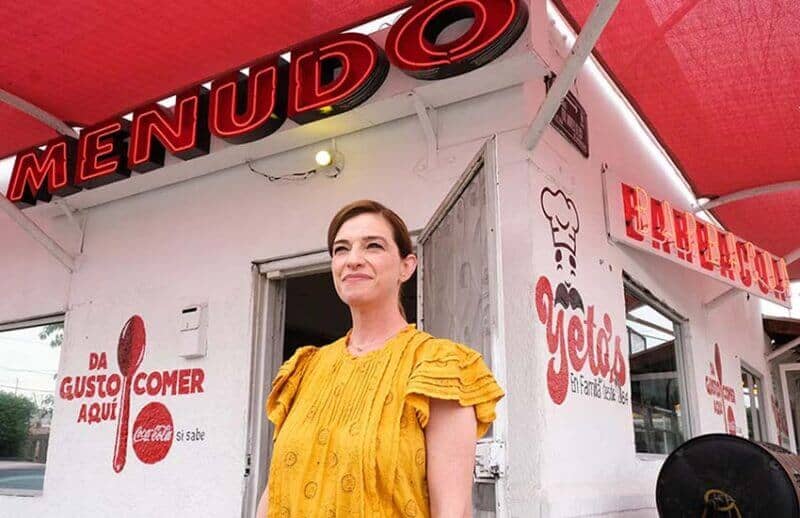
Thanks to Herrera, she said, she had a “chance to eat burritos on both sides of the border,” in Juárez and El Paso. In both locations, she said the burritos were extraordinary, including those with brisket in El Paso and with rice in Juárez.
Throughout the special, Jinich notices connections between both sides of the border as well as differences. “So many businesses depend on each other on both sides,” she said. “So many families live and thrive on both sides.”
“So many restaurants in El Paso depend on getting produce from Mexico,” she added. “… So many businesses in Mexico depend on technology, parts, appliances from the U.S.”
There’s even a moment in the special that spotlights cattle connections between the two nations. As the show explains, cattle with both Mexican and American roots are raised in Mexico before coming across the border to mature in the States — and ending up on American tables.
Jinich recognizes the continuing challenges facing the borderlands. In episode one, she shows the border wall and speaks with Corchado about the issues he covers as a journalist.
“Alfredo Corchado is a dear friend,” Jinich said. “He specializes in going to investigate all these hard topics — crime, drug cartels et cetera.”
Yet, he also shares a more personal family story about his parents’ journey from Mexico to the U.S. According to Jinich, meeting Corchado’s mother was one of her best experiences on the show.
“She told me he has to focus on these things that are so hard and difficult,” Jinich said. “At the same time, they shared beautiful things along the border. His mother and father were migrant farmers who opened up a restaurant in El Paso that enriches the lives of people in America.”
As Jinich said about her border experiences, “Every single story is an incredible story.”
Rich Tenorio is a frequent contributor to Mexico News Daily.
